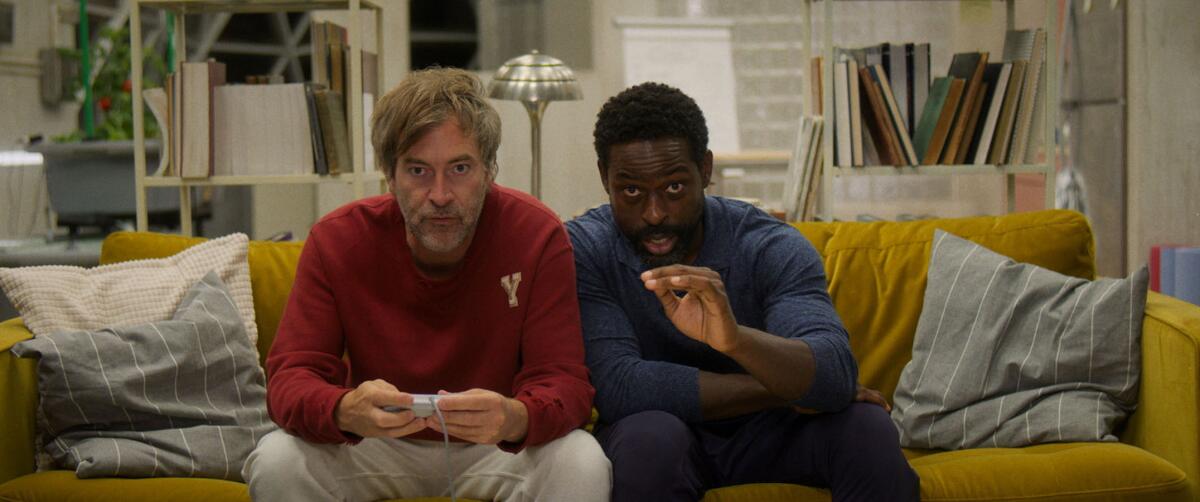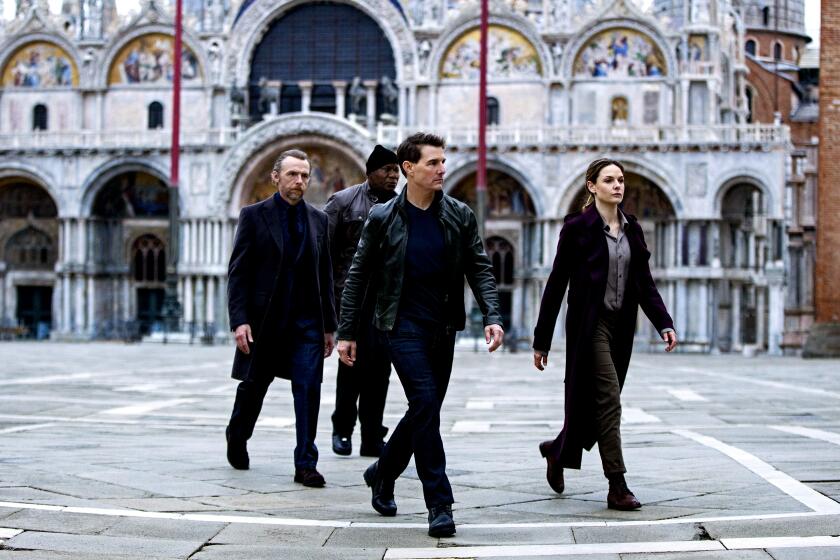High-concept, lo-fi ‘Biosphere’ doesn’t know where to take its interesting premise

- Share via
There are so many flavors of the apocalypse film, including the bombast and spectacle à la Roland Emmerich and the punky desert chic of a “Mad Max.” But there’s also the lo-fi take, the kind of stripped-down indie in which a couple of isolated people experience the apocalypse from afar, with themes of life, death and survival that resonate in a more existential, philosophical register, rather than the action-packed flicks that imagine the end of the world as something more immediate and violent.
Mel Eslyn’s feature directorial debut, “Biosphere,” fits squarely into this sub-genre, in which the apocalypse has already happened off-screen and we don’t need too much information to get up to speed. The surroundings and circumstances merely set the stage upon which an intimate moral quandary plays out; they’re merely a conduit to ask “what would you do?”
For the record:
9:38 a.m. July 6, 2023An earlier version of this review included an incorrect theater. The movie is playing at the Landmark Nuart in West Los Angeles.
The players are the two inhabitants of a biosphere sealed off from the toxic outside world, a self-sustaining geodesic dome with a hydroponic garden as a food source. We meet Ray (Sterling K. Brown) and Billy (Mark Duplass) on their morning jog around the dome’s inner perimeter, as Billy lobs questions and theories about the relationship between brothers Mario and Luigi from “Super Mario Bros.” and Ray calmly volleys back.
Tom Cruise re-teams with director-co-writer Christopher McQuarrie in the first of a two-part saga centered around a mysterious threat to human survival.
This conversation is captured in one long shot around the room, which illustrates both the space and what we’re in for with “Biosphere,” a smart, wordy, esoteric chamber piece infused with references from video games to literature to help underline the relationship between the two men.
Ray is the serious, rational one — he’s the scientist who built the dome — and Billy is the emotional, wacky one. Shockingly (or perhaps not), Billy reveals that he used to be president of the U.S. and that he is responsible for this whole mess in the first place.
The script, by Duplass and Eslyn, a longtime producer for the Duplass brothers and Lynn Shelton, reveals these little nuggets of crucial information in long conversations, fiery spats and comedic riffs between Ray and Billy. It’s clear that they’ve been here a long time and that they are settled into their routine, so for this story to unfold in a way that’s not just two guys talking about video games in a dome, we’re going to need a little conflict.
Enter (or rather exit) Sam, one of the fish fertilizing the hydroponic garden, who turns up dead. After enjoying Sam for dinner, Ray reluctantly informs Billy that they actually ate Diane, the last female fish. Without the fish reproducing, there will be no food, and they will die. The news sends Billy into a tailspin, until Ray notices that another male fish, Norm, is starting to exhibit some interesting changes, transitioning to female from male before their very eyes in response to this threat of extinction.
Perhaps you can guess how it could escalate from there, especially thinking back to “Humpday,” one of Duplass and Eslyn’s previous collaborations with Shelton, which shares a certain kind of daring absurdism with “Biosphere.”
There’s also the foreshadowing of a particular book discussed early in the film — Manuel Puig’s 1976 novel “Kiss of the Spider Woman,” built on the conversations between two cellmates in a Latin American prison.
All the references in their conversations have the added element of informing their relationship and this story as it’s unfolding, which helps to add layers of meaning and understanding to this complex dynamic. This high-concept setting is also a chance to comment on contemporary culture, including our shifting understanding of gender and sexuality.
It’s an interesting premise, and Brown and Duplass hold the screen well when together and apart. But a good idea and good actors don’t necessarily make for a truly compelling feature film. All the elements are there — writing, performance, themes — but there’s not enough plot to sustain a nearly two-hour feature, and as the situation escalates, it becomes clear that they don’t quite know where or how to end things, and it lands with a thud.
A fascinating curio that speaks to many contemporary issues, “Biosphere” feels like a rough draft, as it hasn’t been honed to a degree that allows it to fully penetrate.
Walsh is a Tribune News Service film critic.
‘Biosphere’
Not rated
Running time: 1 hour 45 minutes
Playing: Starts July 7, Landmark Nuart, West Los Angeles
More to Read
Only good movies
Get the Indie Focus newsletter, Mark Olsen's weekly guide to the world of cinema.
You may occasionally receive promotional content from the Los Angeles Times.











